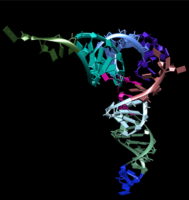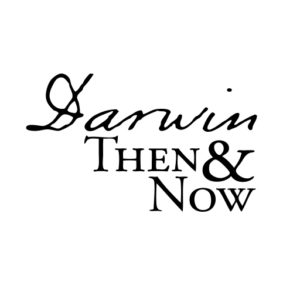 Molecular biology studies the molecular basis of biological activity. The terms “molecule” and “biology” were first introduced in the mid-nineteenth century.
Molecular biology studies the molecular basis of biological activity. The terms “molecule” and “biology” were first introduced in the mid-nineteenth century.
While “molecule” appeared once and “biology” never appeared, not surprisingly, neither term was defined in The Origin of Species. Neither did Charles Darwin refer to proteins, genes, or “mutations” in a molecular biology sense.
Molecular Biology
The phrase “molecular biology, was not coined until nearly eighty years later by the director of Natural Sciences, Warren Weaver, of the Rockefeller Foundation in 1938. At the time, acceptance of Gregor Mendel’s chromosome theory of heredity, a gene-centric perspective of biology, was emerging.
Molecular biology emerged to address questions regarding the mechanisms of genetic inheritance and the structure of a gene.
The race was on when James Watson and Francis Crick described the double-helical structure of deoxyribonucleic acid (DNA) using X-ray crystallography technology in 1953.
Paleobiology
Early in the twenty-first century, a new field in paleontology emerged, known as paleobiology. Paleobiology studies preserved soft tissues and cell structures and studies preserved biomolecular complexes. Studying biomolecular comparisons between similar species gives insight into their biological history.
DNA and RNA
Throughout the late twentieth century, scientists continued learning about DNA and ribonucleic acid (RNA) structures and functions, focusing on the molecular basis of mutation and inheritance.
By early in the twenty-first century, modern molecular biology entered a golden age. Mapping gene locations on chromosomes, associating genes with functions from behavior to morphology, and exploring genetic engineering were new tools to study evolution.
Evidence from the field of molecular biology to validate the theory of evolution scientifically, however, remains a speculative field of study.
Molecular Biology is a subcategory of Evolution and Science
More
Articles on the intersection of evolution and science in molecular biology include –
-
-
-
-
- Phylogenetics of Coronaviruses
- Origin of Bioluminescence
- Whale Evolution Nightmare
- Zika Virus
- New Evolution Nightmare
- R2d2 Disses Darwin
- Natural Selection Unfriends Darwin
- Malarial Evolution Nightmare
- Evolution Bug
- Unpredictable Influenza Virus
- CRISPR Challenges the Tenets of Evolution Theory
- Genetics of Darwin’s Finches
- Genetic Origins Uncoding Evolution
- Evolution of Insect Genetics
- Mutation + Selection = Stasis
- Algae Defy Darwin
- Ancient Microbe Resistance
- Gene Duplication-Driven Evolution
- Evolutionary Tree of Life
- Turtle Genome
- Coelacanth Genome
- New Bird Tree of Life
- Junk DNA Theory
- Sea Star Evolution
- Gorilla Genome Sequence
- Butterfly Nightmare
- Fruit Fly Genetics Research, 100 Years Later
- RNA World
- Chimp Genetics
- Darwin, DNA, and the Neanderthals
- Evolution of Molecular Clocks
-
-
-
Darwin Then and Now is an educational resource on the intersection of evolution and science, highlighting the ongoing challenges to the theory of evolution.
Move On
Explore how to understand twenty-first-century concepts of evolution further using the following links –
-
- The Understanding Evolution category showcases how varying historical study approaches to evolution have led to varying conclusions. Subcategories include –
- Studying Evolution explains how key evolution terms and concepts have changed since the 1958 publication of The Origin of Species.
- What is Science explains Charles Darwin’s approach to science and how modern science approaches can be applied for different investigative purposes.
- Evolution and Science feature study articles on how scientific evidence influences the current understanding of evolution.
- Theory and Consensus feature articles on the historical timelines of the theory and Natural Selection.
- The Biography of Charles Darwin category showcases relevant aspects of his life.
- The Glossary defines terms used in studying the theory of biological evolution.
- The Understanding Evolution category showcases how varying historical study approaches to evolution have led to varying conclusions. Subcategories include –


